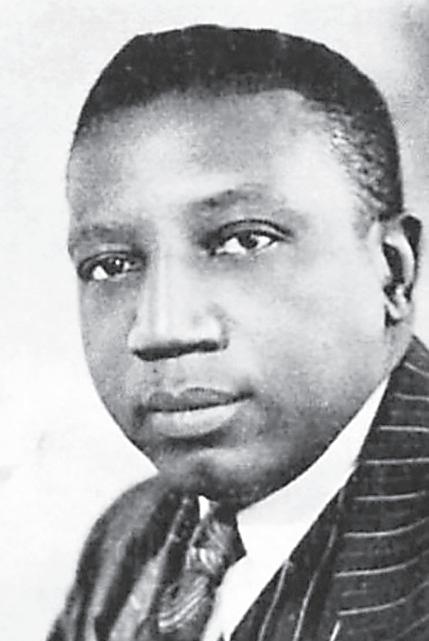
7 minute read
SEE CRIME ON PAGE 2
TSD Newsroom
Simple and direct, that was the mission statement published on the front page of The Tri-State Defender’s first edition 70-plus years ago. It was a mission statement that reflected the hopes and aspirations of African Americans struggling to grow and develop amid the harsh, inhumane conditions underpinning the reality of the “Jim Crow” South. Upon its founding in 1951 by renowned publisher John H. Sengstacke and over the past 72 years, The Tri-State Defender has been led by a succession of dedicated editors, who have worked diligently to see that the newspaper lives up to its mission statement. Editors such as L.O. Swingler, the Defender’s first editor, and L. Alex Wilson, who was severely beaten by an angry white mob as he covered the desegregation of Little Rock’s Central High School in 1957. For the past 16½ years, The TriState Defender has been guided by Executive Editor Karanja A. Ajanaku,
Gov. Lee proposes extending school voucher program statewide, to all students by Marta W. Aldrich Chalkbeat Tennessee
Gov. Bill Lee proposed Tuesday to take Tennessee’s education voucher program statewide, starting with up to 20,000 students who would get taxpayer money next school year to attend a private or home school.
The Republican governor also called for all K-12 students to be eligible for vouchers beginning in 2025.
Lee’s Education Freedom Scholarship Act, offering $7,075 annually for each participant, would mark a massive expansion of eligibility for a voucher program that was billed as a pilot project and is now in its second year. The state’s education savings account program, which currently is limited to three urban counties, has just under 2,000 enrollees.
During an announcement in Nashville attended mostly by lawmakers and allies, Lee said statewide voucher eligibility was his vision for Tennessee during his first gubernatorial campaign in 2018, when he called for more education choices for parents.
“Parents know what’s best for their child as it relates to education,” he said, adding that the vouchers would give all Tennessee families the freedom to choose a good fit, whether it’s in public, private, parochial, or home schools.
His plan would eventually eliminate income requirements and change who could benefit from the vouchers. Rather than giving students from low-income families an opportunity to attend private schools — the original stated purpose of Lee’s education savings account program — the universal vouchers Lee now proposes could also subsidize tuition costs for students from more affluent families who already attend private schools.

It’s uncertain whether the final leg- islation would hold private or home schools accepting voucher money to the same accountability standards that public schools are subject to, including testing requirements or the A-F letter grades that the state is preparing to give out for the first time in December.
“The final details of this legislation aren’t worked out,” Lee told reporters after his announcement. “This is Day One. This will be a legislative effort.”
But Lee’s proposal will face a battle when the General Assembly reconvenes in January. Even under a GOP supermajority, Tennessee’s voucher law squeaked through the House of Representatives in 2019, after sponsors agreed to limit the program to a few urban areas.
The open-ended cost of universal vouchers will be an issue in a state

CRIME CONTINUED FROM FRONT leged criminals loose soon after arrest. Critics of the system say that fact puts more pressure on an outmanned area law enforcement agencies as they try to stem the violence.
That criticism of a “porous” justice system is mirrored in the example of 18-year-old Edio White. On Thanksgiving Day, 15-year-old Anthony Mason was slain in Binghamton during a robbery.

Another 15-year-old, Conner Tucker, is accused of pulling the trigger. Police said White drove the getaway car. He was released on his own recognizance. Both suspects face first-degree murder charges.
“Violence is the top priority of this office, and homicide is the worst of all offenses. And we’re going to do everything we can in that case and in every other case we have that’s pending to make sure that justice is done,” said Mulroy.
According to the Shelby County Crime Commission, the major violent crime rate has risen 5.6 percent compared to last year’s numbers.
It was exceeded by a 9.6 percent rise in Shelby County’s overall crime rate.
Folded within the numbers is a 10 percent jump in gun related incidents in Memphis. There were 510 incidents more than the prior year. The county’s top prosecutor also used the event, which brings together family and friends of victims of violence, to outline plans to address Memphis’ soaring violent crime rate.
VOUCHERS
CONTINUED FROM FRONT where financial experts have warned lawmakers recently that Tennessee’s government needs to control spending in coming years. Lee said his voucher proposal would be funded through a separate scholarship account, not the funding structure currently in place for public schools, but he didn’t provide a cost analysis.
Lee is trying to ride the momentum of other states with Republican-controlled legislatures — including Florida, Iowa, and Arkansas — that passed massive expansions of their voucher programs this year amid parent anger over pandemic-era school closures and disagreements over what kids are taught in public schools.
Arkansas Gov. Sarah Huckabee Sanders, a fellow Republican who signed a law in March creating a school voucher program in her state, appeared on stage with Lee for his announcement. She heralded the work of their states as part of a “conservative education revolution,” with vouchers as a centerpiece.

More important for the legislative battle ahead were pledges Tuesday by Tennessee House Speaker Cameron Sexton and Lt. Gov. Randy McNally to advance Lee’s voucher agenda. Sexton, a charter school advocate and likely candidate for governor in 2026, voted against Lee’s education savings account bill in 2019 and did not say why he now supports Lee’s proposal.
However, the legislature’s Democratic leaders said Lee and GOP leadership are in for a fight — similar to the one in Texas, where a bipartisan coalition of Democrats and rural Republicans beat back Gov. Greg Abbott’s school voucher bill this month during a special legislative session.
During a morning news conference, Tennessee Democrats
These efforts will include contributions from the U.S. Department of Justice.
Tuesday (Nov. 28), it was announced that Memphis will join Houston, becoming the second city to host a Violent Crime Initiative. The data-driven initiative is expected to be accompanied by a surge in federal law enforcement officials, resources, and expertise. These include RICO prosecutors and violent crime experts.
They will work closely with the Memphis Police Department forensic experts, along with counterparts with the FBI and the ATF.
The influx follows an August summit Mulroy hosted. The conference drew area leadership, including both the Memphis Mayor Jim Strickland and the Shelby County Mayor Lee Harris.
They were joined by leadership of the Memphis Police Department and the Shelby County Sheriff’s Office, as well as Juvenile Court Judge Tarik Sugarmon.
The meeting brought a consensus on shared priorities took shape, including adding charged that statewide vouchers will weaken public schools and lead to cuts in everything from school personnel to arts and athletic programs, plus increased property taxes for residents. And they pledged to work across the aisle with Republican lawmakers who have been skeptical of vouchers from the outset.

“On the House side, we’re already reaching out to local officials to join us in supporting public schools,” said Rep. John Ray Clemmons, a Nashville Democrat and House caucus chairman, noting that public school districts are typically the largest employers in the state’s rural communities.
Democrats also warned that, under the governor’s plan, private schools will be able to choose the voucher students they want to accept, especially from families that are already bound for a private education.
“What this is is a coupon program for rich families who do not want to pay the full price of tuition,” said Sen. London Lamar of Memphis, leader of the Senate Democratic caucus.


Meanwhile, leaders of groups both for and against vouchers said they were mobilizing for the fight ahead.
Among the pro-voucher contingent is Americans for Prosperity in Tennessee, part of a conservative network backed by the billionaire Koch brothers, and the American Federation for Children, whose founding chairperson was Michigan billionaire Betsy DeVos.
Groups opposing Lee’s plan include the state’s two largest professional organizations for educators, the Tennessee Education Association and Professional Educators of Tennessee.
Tennessee has been a battleground state in the school choice movement, with a coalition of conservative political organizations using outof-state money to campaign against incumbent lawmakers more teeth to violent crime charges, along with guaranteed prison time for repeat offenders.
“With violent crime in particular, we have a number of initiatives that we’re doing just in our DA’s Office,” said Mulroy in the interview.

“Once they get to us, I’ve issued instructions that for non-fatal shootings, aggravated assaults, and criminal attempted murder – it’s much harder to dismiss those cases.
“There’s a checklist of things we have to do…We have to get approval from the very highest levels of the office before we can dismiss those cases.”
Data sharing is also a priority.
Mulroy said, “We need to who oppose vouchers.
Lee’s newest proposal, if approved, would put Tennessee on track to become the 10th state to adopt a universal voucher program, joining Arizona, Ohio, Oklahoma, North Carolina, and West Virginia. But the change would happen before state officials have enough data to evaluate the effectiveness of its current education savings account program, still in its second year of operation.
For the 2024-25 school year, Lee proposes to provide 10,000 “scholarships” for students who are considered economically disadvantaged, have a disability, or are eligible for Tennessee’s current education savings account program. Another 10,000 would go to a universal pool of students across the state.
Beginning in 2025-26, Tennessee would offer vouchers to any K-12 student.
A one-page promotional document circulated by the governor office said Tennessee would prioritize “currently enrolled students, low-income and public school students if demand exceeds available funding.”
For years, Tennessee has been in the bottom tier of states in funding public education and remains in the bottom half nationally, even with a $1 billion increase this year as part of Lee’s overhaul of Tennessee’s education funding formula do a better job of sharing data with each other and keeping track of the data so we can do data-driven decision making. We can bend the curve on this violent crime. You’ll be hearing more about that in the months to come, especially in the new year.”
In 2020-21, before the latest investment, national data ranked the state 37th for per-student funding. And in its annual grades for education funding, the Education Law Center gave Tennessee two F’s for funding level and effort, and a D for funding distribution.
(Marta Aldrich is a senior correspondent and covers the statehouse for Chalkbeat Tennessee. Contact her at maldrich@chalkbeat.org.)
To reduce recidivism among non-violent offenders, discussion centered around better coordinating with intervention programs, like Memphis Allies. The city’s Group Violence Intervention program is another option. Together, the programs could provide a layer of supervision, by adding requirements to probation. Some of the conditions under discussion were drug treatment, along with job training and placement.

Memphis is plagued with nonviolent offenses, particularly property crimes. In addition to robberies, these often include vehicle-related crimes, like car thefts or property thefts from break-ins.


